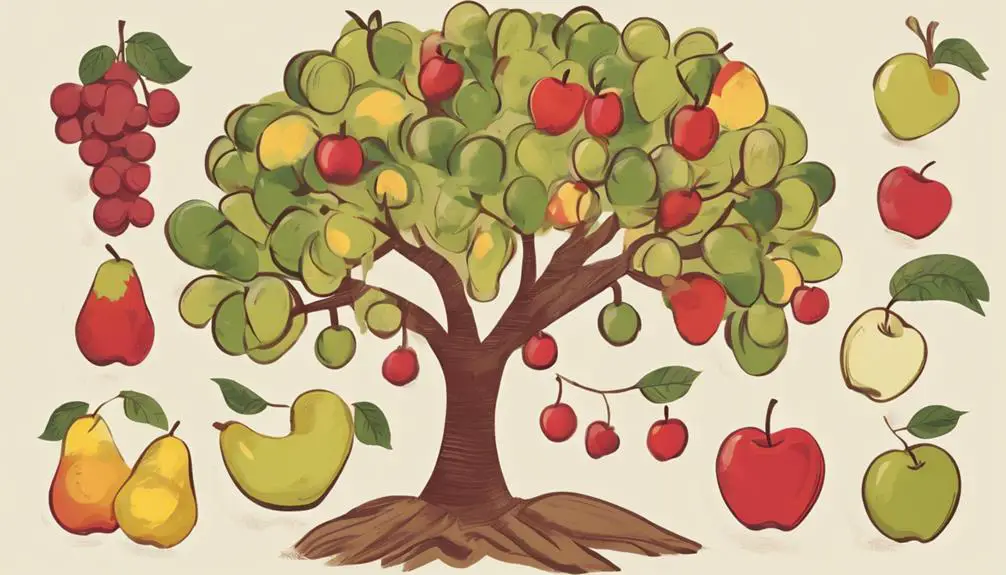Learn about the diverse interpretations of 'fruitfulness' in the Bible, a concept encompassing far more than physical reproduction.

Types of Fruitfulness in the Bible
When you think of 'fruitfulness' in the Bible, you might first recall Genesis 1:28 where God commands Adam and Eve to 'be fruitful and multiply'.
But did you know that fruitfulness in the Bible extends beyond just reproduction? It's also a metaphor for prosperity, abundance, spiritual growth, and character development.
What could this all mean for your personal faith journey? Hold onto that curiosity as we explore the multifaceted concept of biblical fruitfulness together.
Key Takeaways
- The Bible uses fruitfulness to symbolize divine providence, spiritual growth, and Christian character development.
- Prosperity and abundance in Biblical context transcend material wealth, emphasizing spiritual richness and holistic wellbeing.
- Spiritual fruitfulness is reflected in the believer's transformation, showcasing divine attributes and spiritual maturity.
- The Fruits of the Holy Spirit represent divine qualities manifested in believers, indicating the Spirit's active presence and transformation power.
Literal Fruitfulness in the Bible

Diving into the realm of 'Literal Fruitfulness in the Bible', you'll discover a myriad of examples where this concept isn't only prevalent, but it's also used as a powerful metaphor for prosperity and abundance. Agricultural symbolism is ubiquitous in Biblical texts, often serving as a tangible representation of spiritual concepts and divine promises. The fruits and yields of the land, in their rich and varied forms, are potent symbols of God's providence and the rewards of human labor and obedience.
Biblical harvests, for instance, encapsulate this idea perfectly. They're often depicted as times of joy and celebration, reflecting the fruitfulness of the land and the blessings accrued from hard work and faith. In the Old Testament, the annual harvests were deeply significant events, marked by feasts such as Passover, Pentecost, and Tabernacles. These weren't just agricultural affairs; they were profoundly religious occasions, expressing gratitude and acknowledging God's sovereignty over the land's bounty.
In essence, the theme of literal fruitfulness in the Bible serves as a vivid reminder of God's provision and the inherent value of agricultural labor. It's a theme that's deeply intertwined with the agrarian culture of the Biblical era, offering a tangible connection between man, his work, and divine providence.
Fruitfulness as Prosperity and Abundance

Exploring the concept of 'Fruitfulness as Prosperity and Abundance' in the Bible, you'll encounter the transformative power this metaphor holds, embodying not just material wealth, but also spiritual richness and emotional fulfillment. This idea is reflected in the wealth blessings often mentioned in the scriptures, where prosperity is viewed as a divine favor.
Yet, this biblical concept of fruitfulness transcends mere physical prosperity. It's an abundance mindset that permeates every aspect of life, indicating a condition of overflowing bounty that isn't limited to financial wealth. It mirrors a holistic prosperity, which integrates material well-being, emotional balance, and spiritual growth.
The Bible underscores this in Proverbs 11:25, stating, 'A generous person will prosper; whoever refreshes others will be refreshed.' This scripture portrays prosperity as a reciprocal process; you're blessed to become a blessing to others. It's about recognizing that your fruitfulness isn't solely for your benefit, but also for the enrichment of those around you.
Thus, understanding 'Fruitfulness as Prosperity and Abundance' in the Bible necessitates acknowledging its multi-dimensional perspective. It's about achieving wealth blessings, adopting an abundance mindset, and sharing these blessings generously.
Spiritual Fruit in Biblical Teachings

In biblical teachings, the term 'Spiritual Fruit' holds significant weight, representing the visible manifestation of a believer's transformation through the power of the Holy Spirit. Analogous to the natural process of a seed maturing into a bountiful fruit, it metaphorically describes the spiritual growth of believers under divine influence.
Your spiritual journey, akin to Biblical Botany, demands careful nurturing and cultivating in the fertile soil of faith. As a believer, you're called to produce Spiritual Fruit, a manifestation of God's transformative work within you. This isn't merely a superficial change, but a deep, intrinsic transformation, an internal reorientation towards the divine attributes of love, joy, peace, patience, kindness, goodness, faithfulness, gentleness, and self-control.
The concept of 'Spiritual Harvest' further amplifies this metaphor. Just as a farmer anticipates a plentiful harvest after a season of toil, you can expect a Spiritual Harvest – a yield of spiritual fruit – after a period of spiritual growth and maturation. It's a tangible demonstration of the life-altering power of the Holy Spirit in a believer's life, and a reflection of spiritual maturity and divine character.
Fruitfulness in Christian Character Development

Fruitfulness, as a vital aspect of Christian character development, isn't just about bearing spiritual fruit, but it's also about nurturing these godly traits for personal growth and the benefit of others. It's an ongoing process of Character Transformation that requires active participation and commitment.
The development of Christian Virtues, as part of this transformation, is fundamental to fruitfulness. It's about cultivating qualities such as love, humility, patience, and kindness in your life. These virtues, when nurtured correctly, bear fruit that reflects the character of Christ. However, this doesn't happen overnight. You're like a tree planted by the streams of water, constantly drawing nutrients for growth and development. The process is gradual and requires perseverance.
The Fruits of the Holy Spirit

Nine distinct fruits of the Holy Spirit, as detailed in the biblical book of Galatians, are manifested in a believer's life when they allow the Spirit to work within them. These fruits – love, joy, peace, patience, kindness, goodness, faithfulness, gentleness, and self-control – aren't mere character traits. Instead, they're divine qualities that reflect the nature of God Himself, made evident in your life through the Holy Spirit's guidance.
Through spiritual discernment, you'll recognize these fruits as indicators of the Spirit's active presence in your life. They're not earned or achieved, but rather received, as you surrender and open yourself to the Spirit's transforming power. This process isn't passive, however. It requires active engagement and intentional pursuit of a relationship with God.
The Holy Spirit's guidance is key in cultivating these fruits. As you lean into the Spirit's influence, you're not merely improving yourself, but rather, you're allowing the divine to reshape and refine you. You're becoming more Christ-like, embodying the fruits of the Spirit in a tangible way. This, in essence, is the true fruitfulness in the Bible – the manifestation of God's nature in your life through the work of the Holy Spirit.
Frequently Asked Questions
How Is Fruitfulness Portrayed in Other Religious Texts Apart From the Bible?
In other religious texts, fruitfulness is portrayed differently.
In Buddhism, it symbolizes enlightenment, the fruit of human effort and wisdom.
Hinduism, on the other hand, represents fertility with lush, abundant fruits, signifying prosperity and life's richness.
You'll find these themes provide a deeper understanding of the spiritual journey, each fruit's symbolism contributing to the religion's teachings.
It's fascinating how each religion interprets fruitfulness.
What Is the Historical Context Behind the Concept of Fruitfulness in the Bible?
You're exploring the historical context of fruitfulness in the Bible. Biblically, fruitfulness isn't just about agriculture—it's loaded with symbolism. It often represents prosperity, success, and God's blessing.
Agriculture was a central part of life in biblical times, so it's no surprise that fruitfulness imagery is abundant. Understanding this context can enrich your interpretation of biblical passages and provide deeper insight into their original meaning.
How Does the Idea of Fruitfulness in the Bible Relate to Modern Agricultural Practices?
You might relate the concept of fruitfulness in the Bible to modern agricultural practices through Biblical Harvesting. This spiritual perspective sees farming as a sacred duty, where you're not just growing food, but nurturing life.
It's about stewardship, ensuring you're caring for the land and its resources responsibly. So, fruitfulness isn't just about yield, but also the quality of your work and its impact on the environment.
Are There Any Controversies or Debates Surrounding the Interpretation of Fruitfulness in the Bible?
Yes, there are indeed controversies and debates about the interpretation of fruitfulness in the Bible. These discrepancies arise from varying theological perspectives on fruitfulness.
Some interpret it literally, relating to fertility and abundance, while others see it symbolically, as virtues or spiritual growth. It's important to consider the context and the original language when exploring these interpretations.
Different denominations may also have unique views, adding to the complexity.
How Can the Concept of Fruitfulness in the Bible Be Applied to Daily Life and Personal Growth Today?
You can apply the concept of fruitfulness to your daily life by nurturing qualities like love, joy, and patience, which the Bible often symbolizes as spiritual harvest.
It's about personal growth, not just productivity. So, don't just focus on what you're achieving, but also who you're becoming.
That's the essence of fruitfulness symbolism in your everyday life.
Conclusion
In conclusion, you've explored the multifaceted concept of fruitfulness in the Bible. It's not merely about literal production of fruit, but symbolizes prosperity, abundance, spiritual growth, and character development.
The fruits of the Holy Spirit represent how this fruitfulness manifests in a Christian's life. Understanding these layers deepens your appreciation of biblical teachings and their relevance in cultivating a fruitful Christian life.
Remember, this fruitfulness is an ongoing, transformative process.



Sign up